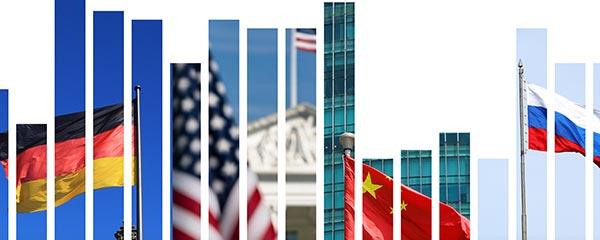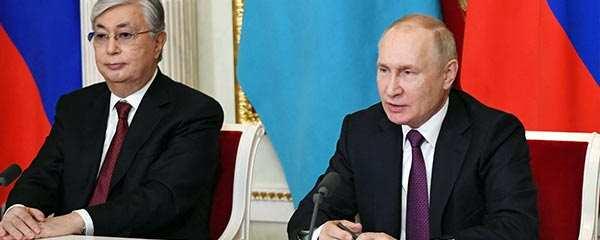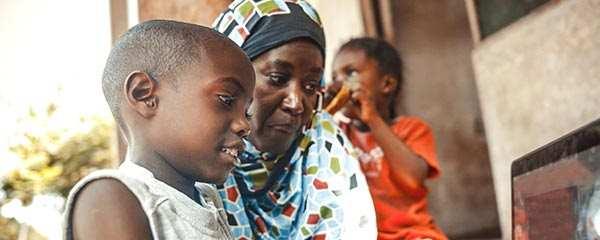This article is the second in a series detailing the results from the latest Rating World Leaders report, which analyzes trends in approval ratings of the leadership of the U.S., Germany, Russia and China in over 130 countries.
LONDON -- The United States lost its place as the most influential global power in Africa last year as its star status dimmed and other countries -- China in particular -- gained fans.
A new Gallup report shows median approval ratings of Washington -- indicative of the country’s soft power -- slipped from 59% in 2022 to 56% in 2023. Of the four global powers asked about, the U.S. was the only one not to see its image improve across Africa in 2023. Meanwhile, China’s approval in the region rose six percentage points, from 52% in 2022 to 58% in 2023, two points ahead of the U.S.
Germany’s leadership image improved too, albeit only from 51% to 54%, placing it and the U.S. on similar footing. And after plummeting in 2022, Russia’s leadership remained the least popular, although its median approval rating increased by eight points in 2023 to 42% -- rebounding to its level in 2021, before the invasion of Ukraine.
How China's Image Improved in Africa
Last year, China recorded its highest leadership approval rating in Africa in a decade. In seven countries -- many in western Africa -- Beijing saw double-digit increases in approval compared with 2022. The largest of these came in Ghana (+15 points), Cote d’Ivoire and Senegal (+14 points each).
In all of these three countries, similar proportions of people disapproved of China’s leadership in 2022 and 2023. The decisive shift in approval came from a corresponding collapse in the proportion of people saying they did not have an opinion of Beijing.
In recent years, Chinese influence -- and investment -- on the African continent have soared. China is now Africa’s biggest single trading partner. Beijing’s Belt and Road Initiative spans a significant chunk of the continent and invests heavily in infrastructure projects.
Competition for Influence Gets Tighter for U.S.
Although median approval of the U.S. dipped by three points across Africa last year, Washington saw double-digit increases in approval ratings across seven countries -- Ghana (+14 points), Mauritania, Cote d’Ivoire (+13 points each), Tunisia (+12 points), Mozambique (+11 points), Senegal and Ethiopia (+10 points each) -- overlapping the approval gains China experienced.
Despite these increases, U.S. approval ratings fell sharply elsewhere -- in Uganda (-29 points), Gambia (-21 points) and Kenya (-14 points). Of these three, only ally Kenya maintained majority approval. Ratings of U.S. leadership were lowest in Libya (23%) and Somalia (25%).
The U.S. has had an advantage over China’s leadership across the continent in most years since 2007, although there was essential ratings parity between 2016 and 2019. But in 2023, China nudged ahead by two points over the U.S. Washington and Beijing’s rivalry on the continent is centered on many geopolitical issues, including a race to secure access to precious minerals and disputes over debt relief.
Russia’s Image Rebounds After Invasion
Since 2022, Moscow’s image in Africa has improved even more than China’s. When Russia invaded Ukraine in February 2022, it lost significant support across the continent, as it did across the rest of the world. But now that more than two years have passed since the war began, Moscow’s image has recovered. Median approval of Russian leadership now stands at 42%, up from 34% the previous year. It has not been higher since 2012 (47%).
Russia has seen double-digit increases in eight countries and equivalent decreases in just two: Uganda (-16 points) and Gambia (-11 points). But support remains strongest in countries in the Sahel, where Russia has a significant military presence through its mercenary Wagner Group, including Mali (89%), Burkina Faso (81%) and Chad (76%). In these three countries, Russia is the dominant power in terms of leadership approval ratings.
Bottom Line
Major global powers have increasingly shifted their focus to Africa in recent years, albeit for different reasons. Last year, the playing field changed. The United States’ slight drop in approval plus China’s gains have placed the latter’s ratings slightly above its Western rival’s. But in the grand scheme of things, median approval ratings of Washington, Beijing and Berlin are closely contested across much of the continent.
The biggest change, however, was in perceptions of Russia. Although much of the world continues to view President Vladimir Putin and Russian leadership with disdain, Moscow’s popularity in Africa rose in 2023, recouping its losses after the invasion of Ukraine.
As Africa’s young population continues to grow, and with its importance on the global stage unlikely to wane, questions remain over whose approach to foreign policy in Africa will prove most effective at winning the hearts of its people in coming years.
Coming soon: Inside the U.S. and China’s Competition for Hearts and Minds
To stay up to date with the latest Gallup News insights and updates, follow us on X.
For complete methodology and specific survey dates, please review Gallup's Country Data Set details.
Learn more about how the Gallup World Poll works.




